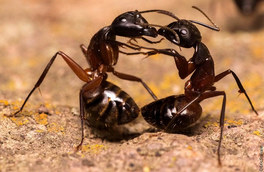 The insects crawl tired of summer across the floor of our cottage, which to them is just a peculiar part of the woods. Only the diehard ants continue at the same speed, as though keeping up the same frenetic pace will save them from the dark apocalypse of winter. The immediate instinct is to stamp them out; its my floor and they're not supposed to be here. Yet, we've all managed together through summer's inferno, and after a moment's reflection, it doesn't seem right to snuff out those who have been along for the ride. They'll end up in the vacuum cleaner eventually, but for now I stare at them and consider all that we've been through. At first, we froze. It was as though the summer would never come. Then presto, the warmth came, but it wouldn't stop there. The mercury kept on rising until it felt like Mumbai in May, only without the humidity. This couldn't last long, we thought, but we were wrong and the forest fires began to rage. Cool Sweden was shocked into seeking help from its European partners, France and Italy, to put out the blaze, the remains of which drifted past us in clouds of smoke across Lake Mälaren. Torrential rains came and one began to consider building an ark. Lightning struck the aircraft my children and I were to fly to the United States in. I imagined that the batteries were singed, like crumbs of burnt bread in the toaster. We flew four days later on a rare peaceful day sandwiched between two days of lightning storms. Events in our microcosm mirrored the world: singed, burning, fleeing before the apocalypse. Had humans learnt nothing? We know that collaboration is better than competition and conflict, and still we resort to tribalism. The leaders of the world were suddenly like ants on my kitchen floor: desperately moving at a frenetic pace without thinking, pre-programmed by genetics and the legacy of their species to continue uselessly scuttling about at one another's expense. With all of the attention in the world given to innovation, couldn't we find a better way to organize ourselves? At the tail end of this long and trying summer I resort to the haven of a new book, the sort of book that turns all of our complaining and fretting on its head by presenting the facts of history. Although it doesn't seem so after this summer, violence in our world has decreased dramatically through the ages. Humans are much less likely to die in violent circumstances today than at any previous time in history. It seems that when human civilization is put under the microscope, the details tell us that "the better angels of our nature" (a phrase used by Abraham Lincoln and the title of the book by Steven Pinker) are winning. We've changed, irreversably, and its so important to know this so that we can build on it. The smoke of forest fires and the terrible accounts of war blurting out of the radio have made this summer bewildering. I thank my lucky stars that there are some people who can keep cool and look at the facts. The ants on my kitchen floor suddenly assume greater meaning as an example not to follow.
0 Comments
|
AuthorSee About. Archives
November 2023
Categories |
 RSS Feed
RSS Feed